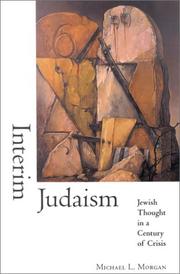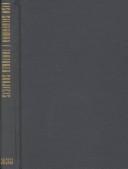| Listing 1 - 2 of 2 |
Sort by
|

ISBN: 128206598X 0253108519 9780253108517 0253338565 0253214416 9780253214416 9780253338563 9781282065987 Year: 2001 Publisher: Bloomington, IN : Indiana University Press,
Abstract | Keywords | Export | Availability | Bookmark
 Loading...
Loading...Choose an application
- Reference Manager
- EndNote
- RefWorks (Direct export to RefWorks)
Interim JudaismJewish Thought in a Century of CrisisMichael L. MorganProbes the impact of the 20th century on Jewish belief and practice.Confronting the challenges of the 20th century, from modernity and the Great War to the Holocaust and postmodern culture, Jewish thinkers have wrestled with such fundamental issues as redemption and revelation, eternity and history, messianism and politics. From the turn of the century through the 1920s, European Jewish intellectuals confronte
Judaism - 20th century. --- Holocaust, Jewish (1939-1945) --- Judaism --- Redemption --- Revelation --- Influence. --- Judaism.

ISBN: 1282659898 9786612659898 0226757528 9780226757520 0226757536 9780226757537 0226757544 9780226757544 9781282659896 6612659890 Year: 2001 Publisher: Chicago : University of Chicago Press,
Abstract | Keywords | Export | Availability | Bookmark
 Loading...
Loading...Choose an application
- Reference Manager
- EndNote
- RefWorks (Direct export to RefWorks)
At one time in Europe, there was a point to pain: physical suffering could be a path to redemption. This religious notion suggested that truth was lodged in the body and could be achieved through torture. In Tortured Subjects, Lisa Silverman tells the haunting story of how this idea became a fixed part of the French legal system during the early modern period. Looking closely at the theory and practice of judicial torture in France from 1600 to 1788, the year in which it was formally abolished, Silverman revisits dossiers compiled in criminal cases, including transcripts of interrogations conducted under torture, as well as the writings of physicians and surgeons concerned with the problem of pain, records of religious confraternities, diaries and letters of witnesses to public executions, and the writings of torture's abolitionists and apologists. She contends that torture was at the center of an epistemological crisis that forced French jurists and intellectuals to reconsider the relationship between coercion and sincerity, or between free will and evidence. As the philosophical consensus on which torture rested broke down, and definitions of truth and pain shifted, so too did the foundation of torture, until by the eighteenth century, it became an indefensible practice.
Torture --- Criminal justice, Administration of --- History. --- early modern, time period, era, france, french, europe, european, body, history, historical, academic, scholarly, research, suffering, pain, physical, redemption, religion, trauma, theory, theoretical, true story, torture, 1600s, 1700s, 18th century, illegal, crime, criminal, transcript, interrogation, physician, surgeon, witness, execution, apologist, abolitionist, activist.
| Listing 1 - 2 of 2 |
Sort by
|

 Search
Search Feedback
Feedback About
About Help
Help News
News